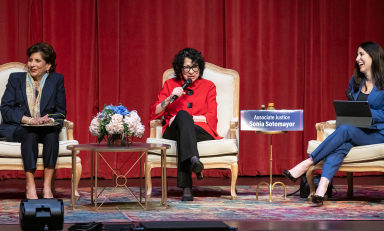Citing Emerson, Hawthorne, and Thoreau, Occidental President Jonathan Veitch the Class of 2015 at the College's annual Convocation ceremony August 31 by drawing a series of parallels between liberal arts colleges and the utopian communities of antebellum America.
"It has been observed that the liberal arts college is the longest-running utopian experiment in existence," Veitch told the 580 incoming students assembled in Thorne Hall before the start of classes. "It is not an overstatement to say that the liberal arts college is an intentional community with utopian aspirations of its own."
But what, Veitch asked, do the idealistic goals and brief lives of the Oneida Community, the Harmonists and Owenites of New Harmony, and the Transcendentalists of Brook Farm and Fruitlands have to do with the newest members of the Oxy community?
"I hope that you will take these next four years in the same spirit as the participants in Fruitlands, Oneida, and Brook Farm," he said. "That means an attitude of experiment, an embrace of oddballs and eccentrics, a willingness to build community and imagine its perfection."
Those skeptical of the similarities between antebellum utopias and liberal arts colleges, Veitch said, should consider George Ripley's description of Brook Farm:
Devoted Brook Farmers...[enjoyed] moonlit walks in the pine grove...picnics, dances, and evenings devoted to dramatic [activities]...[they] read passages from Racine and Moliere's plays in the original...performed pieces by Beethoven or [joined voices with] the glee club to sing Mozart's...psalms and masses.
"Substitute moonlit walks on Fiji Hill for moonlit walks in the pine grove; imagine the community garden at UEPI standing in for the fields that once supported Brook Farm; add gospel hymns and ‘Occidental Fair' to the list of songs performed by the glee club, and you could easily imagine that life at Occidental isn't that far from Brook Farm after all," he said.
What Occidental has most in common with Brook Farm and the other utopian experiments, Veitch added, "is its optimism, its commitment to experiment, its willful naivete...by that I mean a deliberate refusal to take the world on its own terms; a desire to think through what might be possible, instead of what merely is."
"That kind of experiment constitutes the essence of a liberal arts education, and it is what makes places like Occidental so special."
Prior to Veitch's address, Dean Jorge Gonzalez presented Occidental's two top teaching prizes to three faculty members selected by their peers and by students for their outstanding work in the classroom, in conducting research, and in the life of the College.
Michael Hill, professor of chemistry, was presented with the Graham L. Sterling Memorial Award. Established in 1972 in memory of former trustee Graham Sterling, the Sterling Award is bestowed each year on one or more professors with a distinguished record of teaching, service, and professional achievement, as selected by faculty colleagues.
Politics Professor Regina Freer and Kerry Thompson, associate professor of biology, were presented with the Linda and Tod White '59 Teaching Prize. Established in 2008, the White Prize is awarded based on the votes of sophomores, juniors and seniors, who are asked to nominate teachers who have the ability to engage students and increase their learning, as well as showing a real concern for individual students.



